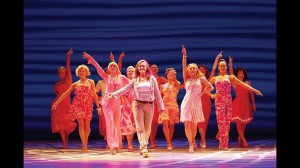Disco days, dancing queens

THE INTERNATIONAL touring production of “Mamma Mia!” opens Jan. 24 at the Cultural Center of the Philippines and runs till Feb. 12.
In the late 1970, ABBA was worshipped worldwide as a hit-making pop supergroup, although not everyone loved its music. Our gang in high school, for instance, wouldn’t be caught dead digging its songs. (“Wow pare, ‘Dancing Queen,’ baduy…”)
At home, however, we listened closely and heard something distinctly attractive with the way the Swedish band’s tunes were crafted. Whenever local AM radio played “Fernando,” “Knowing Me, Knowing You,” “Money, Money, Money” and other ABBA hits, we found ourselves singing along to the lyrics, though unable to articulate what really made the music appealing.
Hearing these songs again on YouTube, we realized that one big factor in ABBA’s enduring success (over 370 million records sold worldwide, and counting) is its “wall of sound” which enhanced the bright presence of its two female lead vocalists, Agnetha “Anna” Fältskog and Anni-Frid “Frida” Lyngstad.
The “wall of sound” – often attributed to American music producer Phil Spector, who is said to have developed it in the early ’60s – is a recording technique in which the number of instruments used in the studio such as guitars and drums are doubled, even tripled, to achieve a dense, reverberating aural effect.
ABBA’s male members and main songwriters, Benny Andersson and Björn Ulvaeus, were apparently influenced by that sound – which they recreated with the help of their studio engineer, Michael B. Tretow, who was in all of the band’s albums.
Article continues after this advertisementThe reason we’re discussing ABBA’s relevance today, 30 years after its breakup, is that its music never really left our consciousness. A number of films, in fact, have used its songs for their soundtrack.
Article continues after this advertisementIn 1994, “The Adventures of Priscilla, Queen of the Desert” featured the tune “Mamma Mia.”
In the same year, “Muriel’s Wedding” had “Dancing Queen,” “Waterloo,” “Fernando,” “I Do I Do I Do I Do I Do” and, again, “Mamma Mia.”
In 1999, a full-blown stage musical, “Mamma Mia!”, adapted 22 ABBA songs in a fictional story of a mother and daughter trying to resolve the identity of the latter’s father on the eve of her wedding. It has been on tour in different cities around the world every year, and is currently playing at the Prince of Wales Theatre in London.
In 2008, a film adaptation of the same title starring Meryl Streep, Colin Firth, Pierce Brosnan, Amanda Seyfried, Christine Baranski and Julie Walters was released.
The stage musical, which has reportedly been seen by over 50 million people around the globe since its West End debut, will open in Manila on Jan. 24 at the Main Theater of the Cultural Center of the Philippines. It will run until February 12.
Curiously, the plot and the context in which ABBA’s songs are performed in “Mamma Mia!” seem tailor-fit for a Filipino audience. That’s the recurring thought when we saw the musical at the Palace Theatre in Manchester in June last year.
Written by British playwright Catherine Johnson, the story is about 20-year-old Sophie, who wants to find her real father so he can walk her down the aisle on her wedding day. Problem is, there were three men who had intimate relations with her mom, Donna – who’s not inclined to make a revelation.
So the daughter sends wedding invites to all three men, without her mother’s knowledge.
Watch out for the musical numbers, especially “Chiquitita” where Donna’s friends (they all used to perform as a girl group) console her while she comprehends the dilemma of dealing with her three exes. One of Donna’s friends, Rosie, has an uncanny similarity with the looks and mannerisms of “Eat Bulaga’s” Ruby Rodriguez.
More than that, many of the songs are bound to trigger memories of one’s lost youth – like saying, hey, admit it, you used to go to discos and ogle at “dancing queens.”